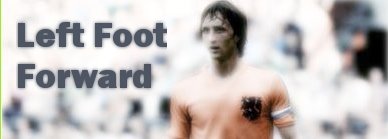Anyway, I digress, I just wanted to celebrate some players from Wild Geese FC v1.0 who perished with GW10.

Jean Il Makoun is a great destructive DMC. Initially I thought I was going to sign him for £2.5m but unfortunately as often is the case I got into a last hour bidding war and ended up using his buy now amount of £4m as the bids crept up over £3.6m (not worth losing him for the sake of £400,000). In addition to his physical prowess and high mental stats he is a very tidy passer and likes to shoot from the edge of the box. Not many formations utilise DMCs - hence their availability on the market, but he can easily slot into a role of MC, with mentality set to defensive and forward runs set to rarely. His great strength is breaking up play - especially against good dribblers, and distributing the ball more than just 10 yards to the nearest colleague. Against the best play makers in the game, set him to man marking and hard tackling and watch them go quiet. I sold Makoun in season 3 to fund the acquisition of a more progressive DMC, Marc-Andre Kruska, the young Dortmund player.
 Damian Ismodes joined Wild Geese FC at the end of season one. He's a strange type of player. If you check him out in FM08 at 18/19 he pretty much has no potential left to gain (he's about 120 ability 130 potential). In FML terms that means he won't progress over time in terms of his attributes increasing. And this happened to me - he had more red arrows (decreasing attributes) than green arrows (increasing attributes). I had training level 5 and loads of other training skills and yet this still happened. However his goals per game average was 0.6. Either as a lone striker or as a striker deployed in wider areas he is a beast - very quick, very strong and surprisingly composed for one so young. Nobody else fancies him (I tried to sell him) and his AF never really went above £100k - but he's definitely one to consider for your original squad.
Damian Ismodes joined Wild Geese FC at the end of season one. He's a strange type of player. If you check him out in FM08 at 18/19 he pretty much has no potential left to gain (he's about 120 ability 130 potential). In FML terms that means he won't progress over time in terms of his attributes increasing. And this happened to me - he had more red arrows (decreasing attributes) than green arrows (increasing attributes). I had training level 5 and loads of other training skills and yet this still happened. However his goals per game average was 0.6. Either as a lone striker or as a striker deployed in wider areas he is a beast - very quick, very strong and surprisingly composed for one so young. Nobody else fancies him (I tried to sell him) and his AF never really went above £100k - but he's definitely one to consider for your original squad. Juan Pablo Caffa is one of those guys who you might not want to splash out on in your initial squad but you should try to grab him in the 2nd and 3rd weeks when all the £100k to £400k players are being signed up. His attributes are rock solid if not spectacular (lots of 14s and 15s) but he dominates games from the left wing. He played in my team on the left side of midfield ahead of Juan Manuel Mata (who I eventually sold for £7m to fund an overhaul of the squad) - Mata more often playing in the AMC role in my cagey 4-4-1-1 formation. Caffa really excelled when passing was focused on the left flank and he would often get in excess of 20 crosses per game - which is very high for FML. His set piece taking was also massively effective for the team (Luisao certainly enjoyed playing with him).
Juan Pablo Caffa is one of those guys who you might not want to splash out on in your initial squad but you should try to grab him in the 2nd and 3rd weeks when all the £100k to £400k players are being signed up. His attributes are rock solid if not spectacular (lots of 14s and 15s) but he dominates games from the left wing. He played in my team on the left side of midfield ahead of Juan Manuel Mata (who I eventually sold for £7m to fund an overhaul of the squad) - Mata more often playing in the AMC role in my cagey 4-4-1-1 formation. Caffa really excelled when passing was focused on the left flank and he would often get in excess of 20 crosses per game - which is very high for FML. His set piece taking was also massively effective for the team (Luisao certainly enjoyed playing with him). The launch of the extra game worlds is nice touch by Sports Interactive and a chance to keep my hand in before the launch in October.





